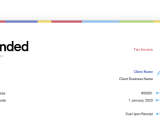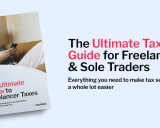
Need a break? 5 tips for freelancers who want to go on holiday
Freelancers don’t get PTO like they would at a traditional office job. But taking a break is essential for your mental well-being and the health of your business. Here are 5 tips you can use to schedule some time away.
Article contents
− +
One of the best advantages of being a freelancer is having more control over your daily work. But stepping away from your business completely, even for just a day, can be stressful.
This is particularly true for freelancers who work completely on their own. With no one else to look after your business, the idea of taking a real holiday can seem impossible.
But if you don’t take time off every once in a while, your mental health will suffer, leading to burnout.
“Fresh thinking requires space, and lots of it,” says freelancer and business coach Lachlan Nicolson, of Leader Guide. “There is great power in pausing; it gives your brain the margin it needs to rest. Without that, we won’t regain the clarity needed for the next season ahead.”

For nearly a decade, Lachlan has been working with business leaders around Australia, and has frequently helped his clients overcome and prevent burnout. His mission is to help Australian families succeed and find happiness in business and personal finance.
Lachlan has plenty of great advice about the importance of taking a break as a freelancer, so we thought he’d be the perfect person to give us tips on how freelancers can take a stress-free holiday.
Tip 1: Set expectations with clients early
The first step to scheduling yourself a holiday is to communicate your plans with clients and customers early.
Make this part of your formal client onboarding process. As you’re introducing them to your businesses and services, let them know you take occasional holidays. You don’t need to be too specific at this stage—just say how often and how much time you plan to take off in a given year, and let them know you’ll give plenty of warning before you’re away.
Then, follow up on that promise in the weeks before you plan to go away. Send a message to all your clients with the dates you’ll be off and what steps you’ll take to ensure they will be well taken care of. Give them a chance to ask questions and tell you what they’ll need, so everyone feels well prepared for your holiday.
Tip 2: Make a “before and after” plan
Once you have a good idea of what your clients will need while you’re on holiday, it’s time to make a plan for the weeks before and after you are off.
For example, if you’re a freelance content writer, you may have to put in a few extra hours before your holiday to ensure you can get all deliverables to your client. If you’re a freelance photographer, you might put in extra time when you get back to finish editing photos you took before your break.
“Be careful not to overwork yourself when making a before and after plan,” advises Nicolson. “The key is to take time off, not double up on work before or after.”
Consider offering clients a discounted rate while you’re on holiday, and reduce the amount of deliverables you provide. Experiment with a few different options, and you’ll discover what works best before your next holiday rolls around.
Tip 3: Consider hiring a virtual assistant
If you’re worried about leaving your business unattended, you may need to hire someone who can keep an eye on things while you’re away. You don’t need to hire a full-time employee to do this—a virtual assistant may be exactly what you need.
Virtual assistants typically work for an hourly wage, and they have a variety of skillsets that can help keep your business afloat while you’re away. They could assist with your freelancer marketing efforts, send updates to clients, or simply be on hand to alert you if an emergency comes up.
If a virtual assistant isn’t something you can afford within your budget right now, consider partnering with another freelancer to cover your business. Offer to take care of certain tasks for them the next time they’re away, and in exchange, you’ll introduce them to your clients as an emergency contact while you’re on holiday.
Tip 4: Automate what you can
There are a variety of tools you can use to automate certain parts of your business while you’re away, which can bring you peace of mind while you’re in relaxation mode.
For example, use platforms like Buffer or Hootsuite to schedule social media posts in advance for yourself or your clients. Slack and Gmail both allow you to schedule messages to be sent at a later date.
If you’re a Rounded user, you can schedule recurring invoices, so you won’t miss a payment while you're on holiday. You can set automatic invoice reminders to go out when an invoice is late.
Give Rounded a try free for 14 days. No CC needed!
Start free trialTip 5: Set “on holiday” boundaries with yourself
“Sometimes, the biggest barrier for freelancers in need of a break is themselves,” Nicolson says. “If you’re constantly checking emails and responding to messages while you’re supposed to be out of the office, you won’t reap the true benefits of taking a break.”
For this reason, you need to set boundaries with yourself when you’re on break. Consider leaving your laptop at home, so you aren’t tempted to check in when you’re supposed to be relaxing. Set an out-of-office message for emails, then turn off notifications on your phone so you can really step away.
Sole traders need a break from work just as much as anyone else. With proper planning and some assistance from others, you can schedule a guilt-free holiday and come back rested and ready to resume business as usual.
Join newsletter
ABOUT ROUNDED
Invoicing and accounting software for sole traders. Get paid faster and relax at tax time.



























